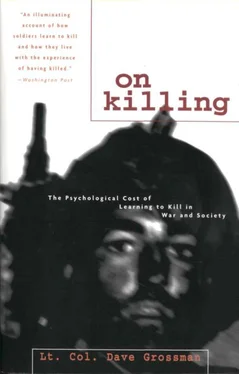Part of the reason for our lack of knowledge in this area is that combat is, like sex, laden with a baggage of expectations and myth. A belief that most soldiers will not kill the enemy in close combat is contrary to what we want to believe about ourselves, and it is contrary to what thousands of years of military history and culture have told us. But are the perceptions handed down to us by our culture and our historians accurate, unbiased, and reliable?
In A History of Militarism, Alfred Vagts accuses military history, as an institution, of having played a large part in the process of militarizing minds. Vagts complains that military history is consistently written “with polemic purpose for the justification of individuals or armies and with small regard for socially relevant facts.” He states, “A very large part of military history is written, if not for the express purpose of supporting an army’s authority, at least with the intention of not hurting it, not revealing its secrets, avoiding the betrayal of weakness, vacillation, or distemper.”
Vagts paints an image of military and historical institutions that for thousands of years have reinforced and supported each other in a process of mutual glorification and aggrandizement. To a certain extent, this is probably because those who are good at killing in war are quite often those who throughout history have hacked their way to power. The military and the politicians have been the same people for all but the most recent part of human history, and we know that the victor writes the history books.
As a historian, as a soldier, and as a psychologist, I believe that Vagts is quite correct. If for thousands of years the vast majority of soldiers secretly and privately were less than enthused about killing their fellow man on the battlefield, the professional soldiers and their chroniclers would be the last to let us know the inadequacies of their particular charges.
The media in our modern information society have done much to perpetuate the myth of easy killing and have thereby become part of society’s unspoken conspiracy of deception that glorifies killing and war. There are exceptions — such as Gene Hackman’s Bat 21, in which an air force officer has to kill people up close and personal for a change and is horrified at what he has done — but for the most part we are given James Bond, Luke Skywalker, Rambo, and Indiana Jones blithely and remorselessly killing off men by the hundreds. The point here is that there is as much disinformation and as little insight concerning the nature of killing coming from the media as from any other aspect of our society.
* * *
Even after Marshall’s World War II revelations, the subject of nonfirers is an uncomfortable one for today’s military. Writing in Army magazine — the U.S. Army’s foremost military journal — Colonel Mater states that his experiences as an infantry company commander in World War II strongly supported Marshall’s findings and noted several World War I anecdotes that suggest that the problem of nonfirers was just as serious in that war.
Mater then bitterly — and appropriately — complains that “thinking back over my many years of service, I cannot remember a single official lecture or class discussion of how to assure that your men will fire.” This included “such formal schooling as the wartime Infantry Leadership and Battle School I attended in Italy and the Command and General Staff College at Ft. Leavenworth, Kansas, that I attended in 1966. Nor do I remember any articles on the subject in Army magazine or other military publications.” [7] I too have graduated from many a U.S. Army leadership school, including basic training, advanced individual training, the XVIII Airborne Corps NCO Academy, Officer Candidate School, the Infantry Officer Basic Course, Ranger school, the Infantry Officer Advanced Course, the Combined Arms and Services Staff School, and the Command and General Staff College at Fort Leavenworth. Not at any time in any of these schools do I remember this problem being mentioned.
Colonel Mater concludes, “It is as if there were a conspiracy of silence around this subject: ‘We don’t know what to do about it — so let’s forget it.’”
There does indeed seem to be a conspiracy of silence on this subject. In his book War on the Mind, Peter Watson observes that Marshall’s findings have been largely ignored by academia and the fields of psychology and psychiatry, but they were very much taken to heart by the U.S. Army, and a number of training measures were instituted as a result of Marshall’s suggestions. According to studies by Marshall, these changes resulted in a firing rate of 55 percent in Korea and, according to a study by Scott, a 90 to 95 percent firing rate was attained in Vietnam. Some modern soldiers use the disparity between the firing rates of World War II and Vietnam to claim that Marshall had to be wrong, for the average military leader has great difficulty in believing that any significant body of his soldiers will not do their job in combat. But these doubters don’t give sufficient credit to the revolutionary corrective measures and training methods introduced since World War II.
The training methods that increased the firing rate from 15 percent to 90 percent are referred to as “programming” or “conditioning” by some of the veterans I have interviewed, and they do appear to represent a form of classical and operant conditioning (a la Pavlov’s dog and B. F. Skinner’s rats), which is addressed in detail in the section “Killing in Vietnam.” The unpleasantness of this subject, combined with the remarkable success of the army’s training programs, and the lack of official recognition might imply that it is classified. But there is no secret master plan responsible for the lack of attention given to this subject. There is instead, in the words of philosopher-psychologist Peter Marin, “a massive unconscious cover-up” in which society hides itself from the true nature of combat. Even among the psychological and psychiatric literature on war, “there is,” writes Marin, “a kind of madness at work.” He notes, “Repugnance toward killing and the refusal to kill” are referred to as “acute combat reaction.” And psychological trauma resulting from “slaughter and atrocity are called ‘stress,’ as if the clinicians… are talking about an executive’s overwork.” As a psychologist I believe that Marin is quite correct when he observes, “Nowhere in the [psychiatric and psychological] literature is one allowed to glimpse what is actually occurring: the real horror of the war and its effect on those who fought it.”
It would be almost impossible to keep something of this nature classified for more than fifty years now, and those in the military who do understand — the Marshalls and the Maters — are crying out their messages, but no one wants to hear their truths.
No, it is not a military conspiracy. There is, indeed, a cover-up and a “conspiracy of silence,” but it is a cultural conspiracy of forgetfulness, distortion, and lies that has been going on for thousands of years. And just as we have begun to wipe away the cultural conspiracy of guilt and silence concerning sex, we must now wipe away this similar conspiracy that obscures the very nature of war.
CHAPTER FOUR
The Nature and Source of the Resistance
Where does this resistance to killing one’s fellow man come from? Is it learned, instinctive, rational, environmental, hereditary, cultural, or social? Or some combination thereof?
One of Freud’s most valuable insights involves the existence of the life instinct (Eros) and the death instinct (Thanatos). Freud believed that within each individual there is a constant struggle between the superego (the conscience) and the id (that dark, lurking mass of destructive and animal urges residing within each of us), and that the struggle is mediated by the ego (the self). One wit once referred to this situation as “a struggle in a locked, dark basement; between a homicidal sex-crazed monkey and a puritanical old maid; being mediated by a timid accountant.”
Читать дальше







